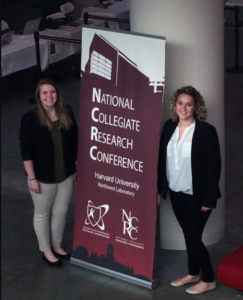Special education undergraduates travel to Harvard University to share research
 Georgia Southern University special education majors Kylie Brady and Rebecca Hinrichs are passionate about helping students with disabilities, as well as the studied benefits of appropriate classroom management. Their passions led to a presentation at Harvard University’s annual National Collegiate Research Conference, the largest student-run research conference in the country, in January.
Georgia Southern University special education majors Kylie Brady and Rebecca Hinrichs are passionate about helping students with disabilities, as well as the studied benefits of appropriate classroom management. Their passions led to a presentation at Harvard University’s annual National Collegiate Research Conference, the largest student-run research conference in the country, in January.
Brady and Hinrichs presented information on their seven-week observations of partnering with K-12 schools, in which they examined the effectiveness of positive and negative behavior management techniques. Specifically, their focus was on students with disabilities who are taught within inclusion classrooms, or general education courses with peers, outfitted with certified teachers who assist with differentiated learning.
“Within the realm of our research, the positive behavior management system included more positive redirections,” said Brady. “Instead of telling a student not to do something, the teacher would tell them what they should be doing and why. Teachers would also verbally praise students when they were doing the right thing.”
Positive behavior management also incorporates a philosophy of teaching expected behaviors. Brady used the example of teaching students how to properly walk in a hallway at school.
“It may seem silly to teach them how to walk down the hallway, but it is a behavior that you expect students know when really they may not,” she said. “It is important to teach those expected behaviors to ensure that students are aware and have been exposed to the behavior you would like for them to display.”
Negative behavior management often includes repercussions for not following rules or expected behaviors.
“Instead of rewarding the students for showing good behavior you want them to display, the teachers practicing the negative management approach would punish students for undesirable or unruly behavior,” Hinrichs explained.
During their observations, Brady and Hinrichs agreed that students within an inclusion classroom frequently remained on task when they were being praised, given incentives and redirected in a positive manner in comparison to students who were punished, reprimanded or had privileges taken away.
“The students all loved the reward systems in place, and they enjoyed the positive encouragement, regardless of whether they had a disability or not,” said Hinrichs. “Yet, most students would shut down after being reprimanded or experiencing negative management.”
The use of a positive behavior management system becomes more vital when working with students with disabilities.
“Often these students struggle and may get discouraged because they think they cannot do something,” said Hinrichs. “It is important to show them they can accomplish their goals, and even if they are just taking small steps, it is important to reward and show them that their progress is celebrated.”
Noting that their research provided qualitative support for positive behavior management systems, Brady and Hinrichs said that they were excited to share their experiences and observations with students, faculty and administrators from around the nation during the conference. They both hope to continue conducting research while working in their careers.
“I think many teachers complete this form of research without even realizing it,” said Brady. “For me, I think positive behavior management is something I will want to model in my own classroom and keep data on the reactions students are having. I can use that data to compare year after year and review my notes if I feel like reactions are changing. That’s a part of being a teacher–constantly growing and researching to meet the needs of your students.”
Brady and Hinrichs are both seniors and are scheduled to graduate in May.
Georgia Southern University, a public Carnegie Doctoral/Research institution founded in 1906, offers 142 degree programs serving more than 27,000 students through nine colleges on three campuses in Savannah, Statesboro, Hinesville and online instruction. A leader in higher education in southeast Georgia, the University provides a diverse student population with expert faculty, world-class scholarship and hands-on learning opportunities. Georgia Southern creates lifelong learners who serve as responsible scholars, leaders and stewards in their communities. Visit GeorgiaSouthern.edu.
Posted in Press Releases

